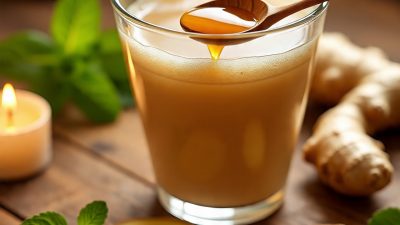Struggling to sleep? Discover science-backed natural sleep aids you probably already have in your kitchen. Learn how everyday foods and herbs can promote deep, restful sleep—no pills required.
Contents
- 1 Why Natural Sleep Aids Matter More Than Ever
- 2 1. Bananas – A Magnesium and Potassium Powerhouse
- 3 2. Chamomile Tea – The Classic Herbal Sedative
- 4 3. Warm Milk – The Natural Sleep Elixir
- 5 4. Honey – Sweet, Sleep-Friendly Sugar
- 6 5. Almonds – Healthy Fats for Deep Sleep
- 7 6. Tart Cherries – Natural Source of Melatonin
- 8 7. Oatmeal – Not Just for Breakfast
- 9 8. Herbal Sleep Tonics from the Pantry
- 10 9. Golden Milk – Anti-Inflammatory Bedtime Drink
- 11 10. Dark Chocolate (In Moderation)
- 12 Evening Sleep-Friendly Snack Ideas
- 13 Bonus Tips: Making the Most of Kitchen Sleep Aids
- 14 Natural Sleep Aids to Avoid Late at Night
- 15 Conclusion: You Don’t Need a Pharmacy to Sleep Better
- 16 FAQ
Why Natural Sleep Aids Matter More Than Ever
Insomnia and poor sleep quality are on the rise—thanks to stress, screen time, and disrupted routines. While sleep medications may offer short-term relief, they often come with unwanted side effects and dependency issues. What if the best sleep remedies were already sitting in your kitchen?
Read : Natural Ways to Relieve Anxiety Before Bed Without Medication
Natural sleep aids like herbal teas, certain fruits, and sleep-friendly snacks are gentle, effective, and safe for long-term use. In this article, we’ll explore evidence-based natural remedies you can use tonight to fall asleep faster and stay asleep longer.
1. Bananas – A Magnesium and Potassium Powerhouse
Bananas aren’t just a convenient snack—they’re loaded with magnesium and potassium, two minerals that help relax muscles and calm the nervous system.
Why They Work
- Magnesium supports GABA production (a neurotransmitter that promotes relaxation).
- Potassium regulates heart rate and muscle contraction, easing the body into rest mode.
How to Use It
Eat a banana 1 hour before bedtime. For added benefit, blend it with almond milk for a natural sleep smoothie.
2. Chamomile Tea – The Classic Herbal Sedative
Chamomile tea is perhaps the most famous herbal sleep remedy, and it’s earned that title. It contains apigenin, an antioxidant that binds to receptors in the brain to reduce anxiety and initiate sleep.
What Science Says
- A study in Phytomedicine found that chamomile improved sleep latency and night-time awakenings in people with insomnia.
- Regular consumption has been linked to better overall sleep quality.
How to Use It
Steep 1 chamomile tea bag in hot water for 5–7 minutes. Drink 30–60 minutes before bed.
3. Warm Milk – The Natural Sleep Elixir
Yes, there’s a reason grandma swore by warm milk. It contains tryptophan, an amino acid that boosts serotonin and melatonin—two brain chemicals essential for sleep.
How It Helps
- Tryptophan → Serotonin → Melatonin (your body’s internal sleep hormone)
- The warmth also has a soothing, psychological effect that signals bedtime.
How to Use It
Warm up 1 cup of milk and add a pinch of nutmeg or turmeric for a calming bedtime latte.
4. Honey – Sweet, Sleep-Friendly Sugar
A small spoonful of raw honey before bed can support the brain’s glucose needs overnight and even stimulate melatonin production.
Bonus Tip
Pair it with chamomile or lemon balm tea to enhance its effects. Avoid large amounts, as too much sugar can keep you awake.
How to Use It
Add 1 teaspoon of raw honey to herbal tea or warm milk 30 minutes before bed.
5. Almonds – Healthy Fats for Deep Sleep
Almonds are a great source of magnesium, healthy fats, and tryptophan—all of which contribute to better sleep.
Research Says
- Magnesium deficiency is linked to sleep disorders and night-time awakenings.
- A handful of almonds before bed can increase sleep duration and quality.
How to Use It
Eat 8–10 almonds as a light bedtime snack, or blend into smoothies for a pre-sleep boost.
6. Tart Cherries – Natural Source of Melatonin
Tart cherries (especially in juice form) are one of the only food sources of natural melatonin. Studies show that they can help regulate sleep-wake cycles.
Clinical Evidence
A study published in the European Journal of Nutrition found that tart cherry juice increased total sleep time by over an hour in older adults with insomnia.
How to Use It
Drink ½ cup of unsweetened tart cherry juice about an hour before bed.
7. Oatmeal – Not Just for Breakfast
Oats are rich in melatonin, complex carbs, and B-vitamins. They help increase the availability of tryptophan in the brain, promoting the release of serotonin and melatonin.
Tip
Avoid sugary instant oats. Go for steel-cut or rolled oats topped with almond butter or banana.
How to Use It
Eat a small bowl of warm oatmeal as a late-night calming snack.
8. Herbal Sleep Tonics from the Pantry
In addition to chamomile, other kitchen herbs and teas have powerful sedative effects.
Lavender Tea: Calms the nervous system and reduces anxiety—two culprits behind sleep problems.
Lemon Balm: Used since medieval times, it’s known to soothe the digestive system and promote calmness.
Peppermint Tea: Helps with night-time digestion, especially if bloating or gas keeps you awake.
9. Golden Milk – Anti-Inflammatory Bedtime Drink
Golden milk combines turmeric, black pepper, and milk into a warming, inflammation-fighting beverage. It helps soothe the body and reduce night-time discomfort.
Ingredients
- 1 cup warm milk (plant-based or dairy)
- ½ tsp turmeric
- Pinch of black pepper
Optional: cinnamon or honey
How to Use It
Drink 30–60 minutes before bed to reduce joint pain, inflammation, or anxious energy.
10. Dark Chocolate (In Moderation)
A small square of dark chocolate (70% or higher) can improve mood, serotonin levels, and reduce stress, thanks to magnesium and tryptophan. But eat it in moderation—too much can be stimulating.
Evening Sleep-Friendly Snack Ideas
Create small, balanced snacks that blend several of these sleep-aiding ingredients.
Easy Bedtime Snack Combos
- Banana + Almond Butter
- Oatmeal with Tart Cherry Juice
- Warm Milk + Honey
- Whole Grain Toast + Avocado
- Greek Yogurt + Chia + Cherries
Bonus Tips: Making the Most of Kitchen Sleep Aids
These natural sleep aids work best when paired with good sleep hygiene. Here’s how to maximize their effects:
1. Keep Your Bedroom Cool and Dark
Temperature and light impact your circadian rhythm. Optimal sleep happens in a cool (65–68°F), dark room.
2. Unplug at Least 1 Hour Before Bed
Blue light from screens reduces melatonin. Turn off your phone or use a blue-light filter in the evening.
3. Stick to a Sleep Schedule
Your body craves rhythm. Going to bed and waking up at the same time daily improves natural melatonin flow.
Natural Sleep Aids to Avoid Late at Night
While they may seem healthy, avoid these foods close to bedtime:
- Caffeine-containing teas (green, black, yerba mate)
- Sugary cereals or snacks
- High-protein meals that are hard to digest
- Spicy foods (can cause acid reflux)
Conclusion: You Don’t Need a Pharmacy to Sleep Better
The most powerful Best Natural Sleep Aids are already in your kitchen—and science backs them up. From a soothing cup of chamomile tea to a banana-almond bedtime snack, you have a range of natural, gentle tools to support better sleep without pills, side effects, or expense.
The next time you toss and turn, reach into your pantry instead of the medicine cabinet.
FAQ
What are the best natural sleep aids found in the kitchen?
Some of the best kitchen-based natural sleep aids include chamomile tea, almonds, bananas, warm milk, tart cherry juice, and turmeric milk—all backed by science for their calming effects.
Does warm milk really help you sleep better?
Yes. Warm milk contains tryptophan and melatonin, both of which are linked to improved sleep quality and relaxation.
Can certain foods eaten at night disturb sleep?
Yes. Spicy foods, caffeine, chocolate, and high-sugar items can disrupt your sleep cycle and should be avoided close to bedtime.
Is chamomile tea effective as a natural sleep remedy?
Absolutely. Chamomile tea contains apigenin, a natural compound that promotes drowsiness and reduces insomnia symptoms.
How soon before bed should I eat or drink these natural remedies?
It’s best to consume natural sleep aids about 30–60 minutes before bedtime to allow your body to digest and feel their relaxing effects.


